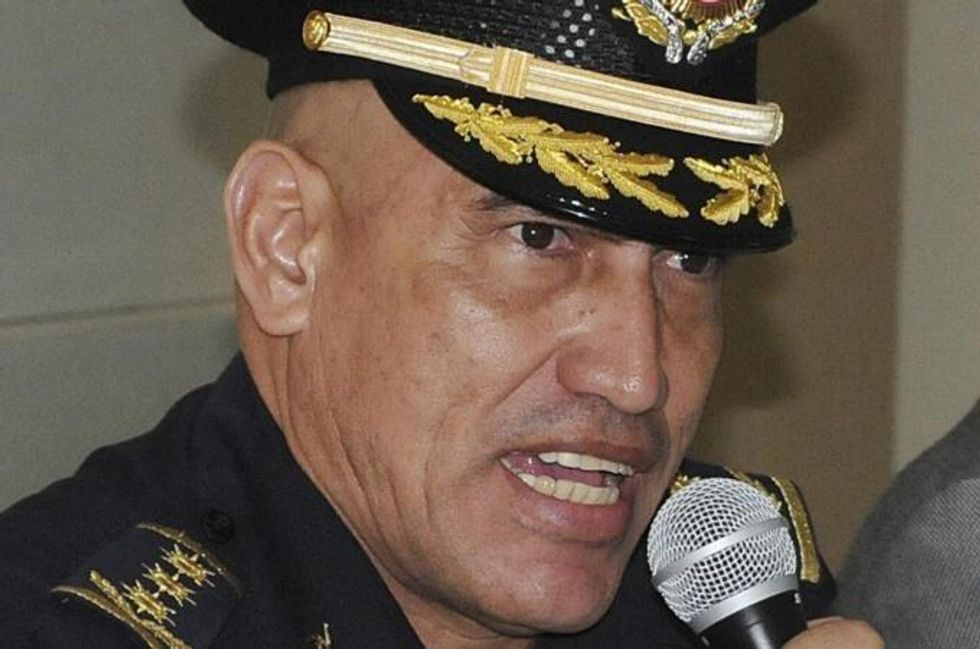A resurgence of death squad activity targeting suspected gang members and others is exacting a mounting toll in Honduras, a country already wracked by violence and impunity. As documented in a series of AP investigative reports, it is increasingly apparent that US-funded Honduran National Police are dispatching summary justice to gang members, in a policy of "social cleansing", with complete impunity.
Since evidence has surfaced linking the Honduran police to death squad activity, US support for the police would violate the "Leahy Law", which mandates withholding aid to foreign security forces when credible evidence exists that they have committed human rights abuses.
Most notably, the director of the Honduran Police, Juan Carlos "El Tigre" Bonilla, is suspected of previous involvement in death squad activity, including three homicides, and is allegedly linked to 11 other deaths and disappearances.
Despite the US' position that funds are carefully administered to avoid supporting human rights abuses, a March AP investigative report found that the US was sending aid to Honduras in contravention of the restriction. Yet the US State Department continues to claim that funding only flows to specially-vetted forces outside of Bonilla's control.
Even though under Honduran law all police operate under the aegis of the director general, the US government has refused to take any remedial measures. US legislators have expressed concerns for years about human rights abuses associated with Honduran security forces.
In March 2012, 94 members of Congress asked the State Department "to suspend US assistance to the Honduran military and police given the credible allegations of widespread, serious violations of human rights attributed to the security forces". Less than a year later, 58 members of Congress asked for an investigationof four civilian deaths in a joint US-Honduran counter-narcotics operation gone awry.
A disturbing follow-up to the initial AP reports reveals even more incriminating evidence linking the Honduran police to ongoing death squad activity. Witnesses have provided additional testimony, backing up their claims with credible evidence, such as the fact that perpetrators of extrajudicial killings were outfitted with police identification badges. A spokesman for the Honduran National Police dismissed witness reports by claiming that gangs kill each other disguised as police officers, an allegation that strains credulity.
When serving as the chair of the Senate Foreign Relations Committee last year, John Kerry suggested that the US should exercise prudence in limiting the administration of funds to forces under Bonilla until he is cleared of wrongdoing. Yet under Kerry's watch, Assistant Secretary for the Bureau of International Narcotics and Law Enforcement Affairs William Brownfield seems to be circling the wagons, embracing instead of distancing the administration from Bonilla.
Seeming to contradict the approach previously articulated by his boss, Brownfield recently expressed his respect and admiration for Bonilla's effective police work. Although members of the US Congress and human rights groups have repeatedly expressed concern about Bonilla's human rights record, Brownfield said he had yet to see any conclusive evidence linking him to misconduct.
Bonilla has not been convicted, but the credibility of the allegations levelled against him raised enough concern to trigger a prohibition on US aid to forces under his control. Notorious corruption in the judiciary and legendary impunity minimise the significance of Bonilla's acquittal on the murder charges, and suspicions about Bonilla have never been thoroughly investigated, by either US or Honduran authorities.
Maria Luisa Borjas, the head of the police internal affairs department in charge of Bonilla's case, said that internal police investigations were impeded by top agency officials, and noted that she was subsequently terminated when she complained about the obstruction.
The US has validated suspicions about Bonilla as far back as 2003. In a State Department cable from 2003 published by WikiLeaks, Dan Fisk, then the Western Hemisphere Affairs Deputy Assistant Secretary, asked Honduran authorities "to send a strong signal about impunity by arresting fugitive policeman Juan Carlos 'Tiger' Bonilla". The State Department also noted in 2007 that Bonilla was suspected in a number of killings.
Brownfield's willful refusal to seriously consider the evidence implicating Bonilla and his efforts to downplay concerns and to continue circumventing funding restrictions is inexcusable.
US Senator Robert Menendez, chairman of the Senate Foreign Relations Committee, stated: "I understand that there are concerns among my colleagues in both the Senate and House about certain US assistance to Honduras... The US has a moral and legal authority to ensure US assistance is not tainted by human rights concerns." Since it is clear that William Brownfield undermines these efforts, Kerry should either insist that Brownfield realign his position to be consistent with the US' moral and legal duty to avoid funding police-operated death squads, or replace him with someone who will.

